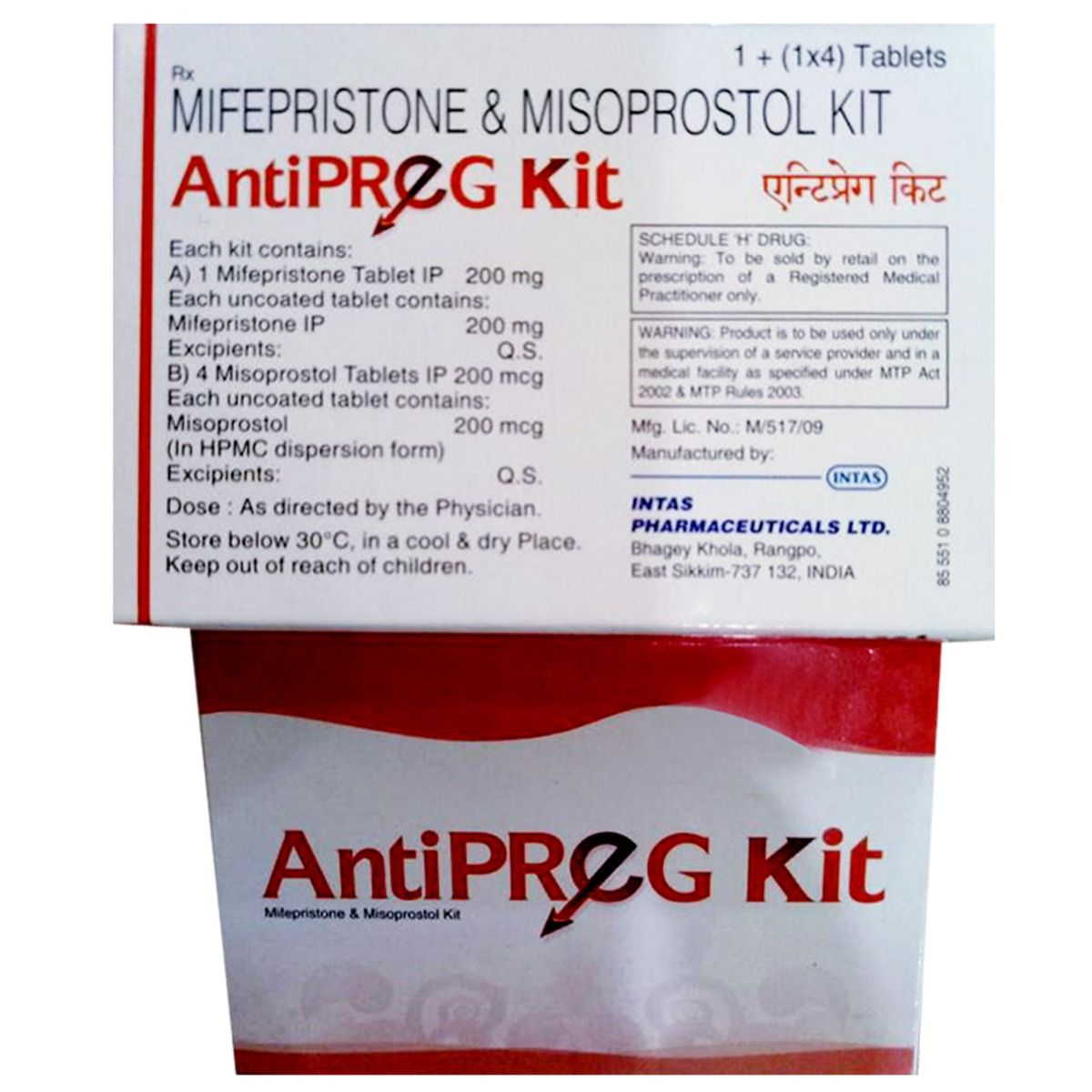Mifepristone+misoprostol
About Mifepristone+misoprostol
Mifepristone+misoprostol belongs to a group of gynaecological medications called ‘Abortifacient’ used for the medical termination of the pregnancy before 63 days after the first day of the last menses period. Mifepristone+misoprostol also works in the second trimester of pregnancy.
Mifepristone+misoprostol contains two medicines, namely: Mifepristone and Misoprostol. Mifepristone is an anti-hormone (anti-progestogen) that blocks the effects of the progesterone hormone required in women to continue the pregnancy. On the other hand, Misoprostol is a prostaglandin that increases the womb’s (uterus) contraction and dilates the cervix, thereby expelling the pregnancy. Thus, Mifepristone+misoprostol together cause termination of pregnancy and must be used one after the other for medical abortion.
A medical abortion generally involves 2-3 visits to a doctor or clinic, which includes giving medicines and then confirmation of termination of pregnancy. Following are the schedule involved in medical abortion:
- Day 1: Medical counselling and examination where doctor instructs to take one tablet of mifepristone (200 mcg)
- Day 2 to 3: You must return to the hospital/clinic 36 to 48 hours after taking the first dose of mifepristone. Your doctor will tell you about this. The tablet of Misoprostol (800 mcg) will now be given either orally or vaginally.
- Day 7 to 14: The doctor will confirm and make sure whether the medical abortion has been completed or not. If the abortion is not complete, you might require more follow-up visits.
In some cases, you may experience nausea, uterine cramps, vomiting, diarrhoea, infection following abortion, dizziness, and uterine bleeding. Most of these side effects of Mifepristone+misoprostol subside with time. But if vaginal bleeding does not stop, please visit the doctor immediately, as it requires immediate medical attention.
Mifepristone+misoprostol should not be stopped abruptly without consulting the doctor as it may lead to incomplete abortion. Inform your doctor before starting Mifepristone+misoprostol if you have had an ectopic pregnancy (when the womb grows in the fallopian tube), using an intrauterine device, or you are breastfeeding, any bleeding disorder or heart problem. Do not strenuous activities like running, heavy exercise, or driving to avoid excessive bleeding. The doctor will also check with ultrasound if the absorption is complete as no bleeding does not mean that abortion is complete.
Uses of Mifepristone+misoprostol
Medicinal Benefits
Mifepristone+misoprostol contains Mifepristone and Misoprostol. Mifepristone works by blocking the effect of progesterone (female hormone) needed to maintain a pregnancy. In the absence of progesterone, the lining of the uterus breaks down as it does every month during the menstrual cycle, and the growth of pregnancy is stopped. It takes approximately 24-48 hours for Mifepristone+misoprostol to show effect. Once it starts acting, you will experience uterine bleeding. But no uterine bleeding does not mean that the abortion is complete. On the other hand, the second medicine is Misoprostol, a prostaglandin analogue that helps increase uterine contractions and relaxes the cervix. Thus Together Mifepristone+misoprostol terminates the state of pregnancy. Misoprostol should be taken at least 24-36 hours after taking mifepristone, either orally or vaginally. This is a non-surgical method which is 90% successful.
Directions for Use
Storage
Side Effects of Mifepristone+misoprostol
- Nausea
- Uterine cramps
- Vomiting
- Diarrhoea
- Dizziness
- Infection following abortion
- Uterine bleeding
Drug Warnings
Do not take Mifepristone+misoprostol if you are allergic to misoprostol and mifepristone, have a heart fitted with an artificial valve, have heart diseases like high blood pressure or high blood cholesterol levels (increased fat in your blood), have asthma, have blood clot problems, have a bleeding disorder, have liver or kidney disease, have anaemia (low haemoglobin) or otherwise malnourished. Taking Mifepristone+misoprostol in these conditions can cause life-threatening conditions in an individual. Mifepristone+misoprostol is known to cause sleepiness, so driving or operating machinery should not be done. If you use contraceptive devices like the intrauterine device (IUD), please remove it before taking Mifepristone+misoprostol. Regular follow-up with the doctor is required for constant monitoring of abortion. If medical termination does not happen or becomes unsuccessful, it should be terminated surgically as it can lead to foetal defects. Your doctor will examine by performing ultrasonography to confirm if the abortion is complete. St John’s Wort (a natural remedy used to treat mild depression) grapefruit juice should not be taken when taking Mifepristone+misoprostol as it is known to interact.
Drug Interactions
Drug-Drug Interactions: Mifepristone+misoprostol interacts with corticosteroids (dexamethasone), antifungal (ketoconazole, itraconazole), antibiotics (erythromycin, rifampicin), anti-epileptic (phenytoin, phenobarbital, carbamazepine), immunosuppressants (cyclosporine, tacrolimus, sirolimus), medicines to treat migraine (ergotamine). So, Mifepristone+misoprostol should not be taken along with these drugs.
Drug-Food Interactions: Please tell your doctor about all the Vitamins, herbs, and supplements you are taking as Mifepristone+misoprostol may interact with them to produce unpleasant side effects. Also, Mifepristone+misoprostol is known to interact with St John’s Wort (a natural remedy used to treat mild depression), and grapefruit juice.
Drug-Disease Interactions: Mifepristone+misoprostol should be taken with caution in people who have a bleeding problem, confirmed or suspected ectopic pregnancy, heart problem, liver or kidney disease, vaginal bleeding, porphyria (an inherited blood disease that may cause nervous system or skin problems).
Drug-Drug Interactions Checker List:
Safety Advice

Alcohol
unsafeAlcohol is known to cause excessive drowsiness and increases uterine bleeding if taken along with Mifepristone+misoprostol.

Pregnancy
unsafeMifepristone+misoprostol is used for medical abortion. If taken in pregnancy, it can lead to abortion.

Breast Feeding
unsafeMifepristone+misoprostol should not be taken if breastfeeding as it may pass through the milk to the baby.

Driving
unsafeDriving is unsafe when taking Mifepristone+misoprostol as it might increase the risk of excessive bleeding.

Liver
cautionMifepristone+misoprostol to be taken with caution, especially if you have a history of Liver diseases/conditions. The dose may have to be adjusted by your doctor.

Kidney
cautionMifepristone+misoprostol to be taken with caution, especially if you have a history of Kidney diseases/conditions. The dose may have to be adjusted by your doctor.

Children
unsafeMifepristone+misoprostol is not recommended for children below the age of 12. The safety and effectiveness of Mifepristone+misoprostol have not been established in children due to limited testing of this drug on children by competent authorities worldwide. If necessary, your doctor will decide whether to give Mifepristone+misoprostol or not.
Habit Forming
Diet & Lifestyle Advise
- Keep your weight under control with body mass index (BMI) 19.5-24.9.
- Opt for a diet rich in whole grains, fruits, veggies, and low-fat dairy products.
- Quitting smoking and not drinking alcohol is the best strategy to lower the risk of any complication.
- Avoid chronic stress and physical exercise like running as it might increase vaginal bleeding.
- Monitor your blood pressure daily and if there is too much fluctuation, then immediately contact your doctor.
- Get an ultrasound done to check if the abortion is done completely to avoid any unwanted complications.
- Try to include heart-healthy omega 3 fatty acid containing food drinks in your daily diet. You can also use low-fat cooking oil like olive oil, soybean oil, canola oil, and coconut oil to lower your elevated blood pressure.
Special Advise
- Get an ultrasound to check whether medical abortion is done completely to avoid unwanted complications.
- Monitor your blood pressure daily and if there is too much fluctuation, then immediately contact your doctor.
- There might be a possibility of becoming pregnant again immediately after the pregnancy termination is complete. It would be best if you started using contraceptives for at least ten days of taking the mifepristone tablet. It is better to discuss contraceptive options with your doctor.
- If you are (Rh factor negative), the use of Mifepristone+misoprostol requires special measures which are taken to prevent Rhesus (Rh) factor sensitisation. So, if you are Rhesus negative, let your doctor know about this before using Mifepristone+misoprostol.
Patients Concern
Disease/Condition Glossary
Medical abortion: It is a procedure in which medicine is used to terminate a pregnancy. It is effectively causing abortion if performed in the first 70 days of pregnancy. Vagina bleeding occurs, and if it does not stop, please inform your doctor as it might require medical supervision. Having a medical abortion is a very emotional decision. You should be mentally prepared for all the risks a surgical absorption could lead to, like incomplete abortion, heavy and prolonged bleeding (may last up to 30 days), fever, digestive system discomfort fever. Also, if the medication does not work, it can lead to an unwanted ongoing pregnancy, leading to fetal defects. So, to avoid any complications, keep in regular touch with your doctor and do as advised.
FAQs
Mifepristone+misoprostol is used for the medical termination of the pregnancy before 63 days after the first day of the last menses period. Mifepristone+misoprostol also works in the second trimester of pregnancy.
Mifepristone+misoprostol contains Mifepristone and Misoprostol. Mifepristone works by blocking the effect of progesterone (female hormone), which is needed to sustain a pregnancy. In the absence of progesterone, the lining of the uterus breaks down as it does every month during the menstrual cycle, and the growth of pregnancy is stopped. Misoprostol is a prostaglandin analogue that helps increase uterine contractions and relaxes the cervix. Misoprostol should be taken 24-36 hours after taking mifepristone, either orally or vaginally.
No, Mifepristone+misoprostol should be taken in the dose and duration as advised by the doctor. Taking it in more than the recommended dose might cause unpleasant side effects like excessive uterine or vaginal bleeding.
No, Mifepristone+misoprostol is not known to affect any future chances of pregnancy. Mifepristone+misoprostol is used for medical abortion of early or unwanted pregnancy.
After taking Mifepristone+misoprostol, you may or may not experience vaginal bleeding, which does not indicate complete abortion. Your doctor will examine with the performing ultrasonography to confirm if the abortion is complete.
Do not take Mifepristone+misoprostol, if you have a heart fitted with an artificial valve, heart diseases like high blood pressure or high blood cholesterol levels (increased fat in your blood), have asthma, have blood clot problems, have a bleeding disorder, have liver or kidney disease, have anaemia (low haemoglobin) or otherwise malnourished. Taking Mifepristone+misoprostol in these conditions can cause life-threatening conditions in an individual.
Mifepristone+misoprostol does not decrease the chances of survival of your future pregnancy. It is specifically used for the present medical abortion of an early or unwanted pregnancy and does not affect future pregnancies. They will not impact your ability to carry a healthy pregnancy in the future.
Mifepristone+misoprostol is a combination of two medicines: Mifepristone and Misoprostol, which belong to a group of gynaecological medications called Abortifacient. Used for medical abortion to terminate an early or unwanted pregnancy.
Store Mifepristone+misoprostol in a cool, dry place away from sunlight. Keep it out of reach of children.
Mifepristone+misoprostol may cause interaction with certain medications, including corticosteroids, antifungals, antibiotics, anti-epileptics, immunosuppressants, and migraine medications. Taking Mifepristone+misoprostol with these medications may cause negative complications. It's essential to inform your doctor about all medications and health histories you are taking, and they will assess your condition and help manage it to avoid complications.
You should take Mifepristone+misoprostol exactly as directed by your doctor. Your doctor will determine the dose and duration based on your pregnancy status, menstrual cycle, medical history, and especially sexual intimation time history. Follow your doctor's instructions carefully and complete the full course as prescribed for a safe and healthy abortion process.
The common side effects of Mifepristone+misoprostol may include nausea, uterine cramps, vomiting, diarrhoea, infection following abortion, dizziness, and uterine bleeding. Most of these side effects of Mifepristone+misoprostol subside with time. If these symptoms become worse, please consult a doctor for relief.






